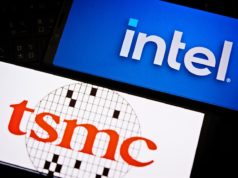![]()
Windows-based tablets may be delayed because of the late delivery of some Intel ![]() software that manages battery life. That report, if accurate, could have substantial implications not only for Microsoft’s hopes of getting a foothold in the tablet
software that manages battery life. That report, if accurate, could have substantial implications not only for Microsoft’s hopes of getting a foothold in the tablet ![]() market, but for Intel’s as well.
market, but for Intel’s as well.
The delay was reported by Bloomberg BusinessWeek on Monday. It cited an unnamed “person with knowledge of the matter,” and added that Microsoft has not approved any tablets with Intel’s Clover Trail processor ![]() because the required power management software is not yet available.
because the required power management software is not yet available.
Windows Still Needs Work?
While Microsoft is allegedly balking at certifying Clover Trail, Intel CEO Paul Otellini reportedly told some of his company’s employees at a recent company event in Taiwan that Windows 8 still needs work — and that it is being released before it’s ready. However, Intel has since denied that report, originally published by Bloomberg, which attributed it to a “person who attended the company event.”
Meanwhile, an Intel spokesperson has said that Clover Trail-based tablets and hybrid tablet/laptops will be available by Oct. 26. Additionally, last week Intel held a media event with Clover Trail tablets from Acer, Asus, Dell, Fujitsu, Lenovo, Samsung and others.
Bloomberg’s Monday story cited a JMP Securities LLC analyst, Alex Gauna, who described the PC ![]() channel as being “in chaos right now” because of the uncertainty about the models coming out for the new Windows, about what consumers and businesses will actually buy, and about how tablets — notably, Apple’s iPad — are beginning to eat into PC sales.
channel as being “in chaos right now” because of the uncertainty about the models coming out for the new Windows, about what consumers and businesses will actually buy, and about how tablets — notably, Apple’s iPad — are beginning to eat into PC sales.
Clover Trail is the processor Intel has chosen to directly compete with the iPad, and a new iPad is expected to be released at the end of the first quarter or beginning of the second in 2013 — that is, only a few months after the holiday season, when Windows tablets are targeted to be on sale.
ARM Tablets Certified
However, while Windows 8, Intel-based tablets could be delayed, Microsoft has already certified tablets based on ARM processors, running Windows 8’s twin, the ARM-ready Windows RT.
While the delay of Windows 8 tablets could be problem for Intel’s aspirations in that market, there is a scenario where it could inadvertently play to Microsoft’s advantage.
One of the concerns about Microsoft massive, coming rollout of Windows RT and Windows 8 machines is the distinct possibility of buyer confusion.
To take just one issue relating to the new platform, Windows RT tablets and Windows 8 tablets will be significantly different. RT machines will not run legacy apps, while Windows 8 machines will, although they would need to be redesigned to take advantage of Windows 8’s tile interface. Both tablets will be launched with a relatively small number of apps designed specifically for that OS version and form factor.
Microsoft has indicated that it is open to RT-based laptops, just as it plans Windows 8 tablets, so hybrid laptops/tablets could exist for either variation of the OS. But, if Windows RT specifically means tablets, or machines that include tablets, it’s conceivable that buyers may be less confused about their choices.
 ASUS X101-EU17-BK 10.1-Inch Netbook (Black)
ASUS X101-EU17-BK 10.1-Inch Netbook (Black)10.1″ WSVGA (1024×600) / Intel Atom N435 CPU (1.433GHz) / 1GB DDR3 / Intel UMA / 8GB SSD / Meego OS / 802.11BGN / 0.3MP Camera / 3…
 Acer Aspire One AOD270-1824 10.1-Inch Netbook (Espresso Black)
Acer Aspire One AOD270-1824 10.1-Inch Netbook (Espresso Black)Acer AOD270-1824 comes with these high level Specs. Intel Atom Dual-Core Processor N2600, Windows 7 Starter, 10.1-Inch WSVGA LED-b…







